 “When the major talents are directors, actors, and scene designers—that’s dead-end theater. Fine to see, but it ain’t going nowhere. You have to turn out good new writers.”
“When the major talents are directors, actors, and scene designers—that’s dead-end theater. Fine to see, but it ain’t going nowhere. You have to turn out good new writers.”
Lillian Hellman, “The Art of Theater No. 1” (Paris Review, Winter-Spring 1965)

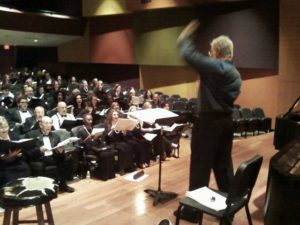 This morning I fly back to New York from Winter Park, Florida, where I attended the
This morning I fly back to New York from Winter Park, Florida, where I attended the 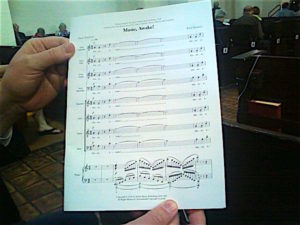 An hour later, Paul and I took our aisle seats in Rollins College’s Knowles Memorial Chapel and listened to the Bach Festival Society Chorus and Orchestra sing and play Music, Awake! to perfection. That was, needless to say, an even more overwhelming experience. Even so, I think I may have been moved more deeply by the surprise-party performance that John and the choir gave for me alone.
An hour later, Paul and I took our aisle seats in Rollins College’s Knowles Memorial Chapel and listened to the Bach Festival Society Chorus and Orchestra sing and play Music, Awake! to perfection. That was, needless to say, an even more overwhelming experience. Even so, I think I may have been moved more deeply by the surprise-party performance that John and the choir gave for me alone.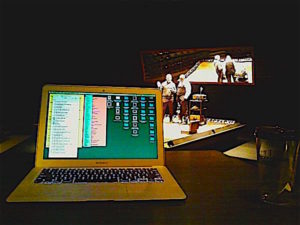 This will be, as regular readers of this blog know, my professional debut as a stage director. I rejoice to say that I’m making it in the company of Barry Shabaka Henley, who appeared in the Chicago premiere of Satchmo earlier this year and has agreed to do the honors in Florida as well. Yes, I’m feeling a little antsy, but Shabaka was stupendous in Chicago, and I have no doubt whatsoever that he’ll tear it up in Florida. I doubt I’ll be blogging quite as often from West Palm Beach as I did from Chicago and San Francisco in January, but I hope to report from the rehearsal hall whenever I can find a few spare minutes.
This will be, as regular readers of this blog know, my professional debut as a stage director. I rejoice to say that I’m making it in the company of Barry Shabaka Henley, who appeared in the Chicago premiere of Satchmo earlier this year and has agreed to do the honors in Florida as well. Yes, I’m feeling a little antsy, but Shabaka was stupendous in Chicago, and I have no doubt whatsoever that he’ll tear it up in Florida. I doubt I’ll be blogging quite as often from West Palm Beach as I did from Chicago and San Francisco in January, but I hope to report from the rehearsal hall whenever I can find a few spare minutes.
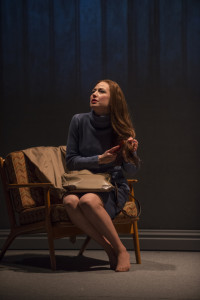 Handsomely mounted by Steppenwolf Theatre Company and staged by Anna D. Shapiro with great delicacy, “Mary Page Marlowe,” which runs for a bit less than 90 intermission-free minutes, consists of a series of loosely linked vignettes that follow the title character from childhood to old age—we see her as a baby and at the ages of 12, 19, 27, 36, 40, 44, 50, 59, 63 and 69—and are performed out of chronological order. In addition, Mr. Letts has left yawning gaps between the 11 scenes, meaning that while it isn’t hard to follow what’s going on at any given moment, you must pay close attention to make the various events in Mary Page’s life add up to a meaningful whole….
Handsomely mounted by Steppenwolf Theatre Company and staged by Anna D. Shapiro with great delicacy, “Mary Page Marlowe,” which runs for a bit less than 90 intermission-free minutes, consists of a series of loosely linked vignettes that follow the title character from childhood to old age—we see her as a baby and at the ages of 12, 19, 27, 36, 40, 44, 50, 59, 63 and 69—and are performed out of chronological order. In addition, Mr. Letts has left yawning gaps between the 11 scenes, meaning that while it isn’t hard to follow what’s going on at any given moment, you must pay close attention to make the various events in Mary Page’s life add up to a meaningful whole….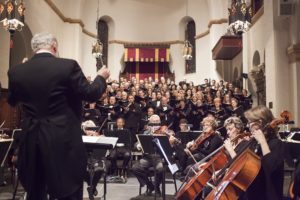 Paul Moravec and I are headed down to Florida this weekend for our latest premiere: John Sinclair and the Bach Festival Society of Winter Park are giving the first performance of our latest collaboration, an anthem for chorus and orchestra called Music, Awake! It was commissioned by the Bach Festival Society in honor of John’s twenty-fifth anniversary its artistic director. In addition to writing the text, I also wrote program notes for the premiere, which takes place on Saturday at 7:30 in Rollins College’s Knowles Memorial Chapel. The program, which will be repeated on Sunday at three p.m., also includes a complete performance of Beethoven’s Ninth Symphony.
Paul Moravec and I are headed down to Florida this weekend for our latest premiere: John Sinclair and the Bach Festival Society of Winter Park are giving the first performance of our latest collaboration, an anthem for chorus and orchestra called Music, Awake! It was commissioned by the Bach Festival Society in honor of John’s twenty-fifth anniversary its artistic director. In addition to writing the text, I also wrote program notes for the premiere, which takes place on Saturday at 7:30 in Rollins College’s Knowles Memorial Chapel. The program, which will be repeated on Sunday at three p.m., also includes a complete performance of Beethoven’s Ninth Symphony.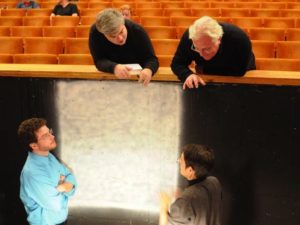 In search of inspiration for the text, I looked at the last scene from The Winter’s Tale, a play that Paul and I both love, and found these words: “Music, awake her; strike!/’Tis time; descend; be stone no more; approach;/Strike all that look upon with marvel.” All at once the idea for a poem about music came to me. It would be what rhetoricians call an “apostrophe,” an exclamatory passage in which an inanimate object or idea—in this case, music itself—is addressed directly, as if it were alive. The poem, I thought, could be about what music does to us when we hear it and are, like Shakespeare’s Hermione, transformed by its magical power.
In search of inspiration for the text, I looked at the last scene from The Winter’s Tale, a play that Paul and I both love, and found these words: “Music, awake her; strike!/’Tis time; descend; be stone no more; approach;/Strike all that look upon with marvel.” All at once the idea for a poem about music came to me. It would be what rhetoricians call an “apostrophe,” an exclamatory passage in which an inanimate object or idea—in this case, music itself—is addressed directly, as if it were alive. The poem, I thought, could be about what music does to us when we hear it and are, like Shakespeare’s Hermione, transformed by its magical power.